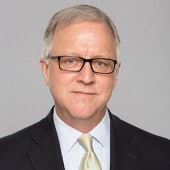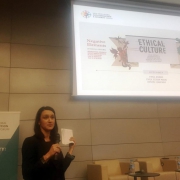Featured Ethics Scholar for December: Dennis Gentilin
Interview with Dennis Gentilin, Whistleblower, Author and Consultant on Corporate Citizenship
 What are your main areas of research/work?
What are your main areas of research/work?
Let me begin by stating that I don’t see myself as a scholar (at least not formally). However I do see enormous value in using the findings and tools from the social and behavioral sciences to help address the ethical challenges facing the business world. This is one of the many reasons I am a big advocate of Ethical Systems.
As one would expect given my experience and background (outlined below), my primary area of interest is employee voice and speak up cultures. What my experience showed me is that even the best “formal systems” (rules, regulations, compliance and other such artifacts) have shortcomings. The best (and arguably the only) way to overcome these is to nurture the “human systems” within organizations. A speak up culture is a core component of this latter system.
Your career trajectory changed quite dramatically. Can you outline your journey from banker to whistleblower?
I joined one of Australia’s largest banks (the National Australia Bank; NAB) on a graduate program in 2000 after completing a degree in banking and finance. I spent 12 months on a graduate program before securing a role on a FX derivative trading desk. Three years later I was publicly named as a whistleblower in a trading scandal that resulted in the resignation of the CEO and chairman, $360 million AUD in losses and incalculable reputational damage.
After all the subsequent court cases were over (the regulator brought charges against four traders), the decision I made was to try and put the experience behind me. I didn’t want the incident or my role in it to define who I was – I felt I had more to offer than just being known as a “whsitleblower”. So in many ways my story is unique as I went on to spend a further 12 years at the NAB in a variety of roles across financial markets and corporate strategy.
But as anyone who has been through an experience like that will tell you, it irrevocably shapes you in some way .What it did to me was drive a really strong interest in human and organisational behaviour. In particularly, I became fascinated (some might say obsessed!) with the question of “Why?”. Why do ethical failures happen? And why will they continue to happen? And how can it be that sometimes seemingly good people can behave in very unethical ways?
To try and find answers to these questions I returned to university to complete an undergraduate degree in psychology. It was here that I was first exposed to the research in the social and behavioural sciences – to say the least I found it enlightening. The research spoke to my experience and provided far more credible answers to many of the questions I was grappling with.
As time went on, ethical failure (unfortunately) became a growing industry so my interest in the topic only grew. What’s more, I felt that the methods we were using to explain and address breakdowns in ethics had shortcomings. There continued to be a disproportionate emphasis on normative tools (i.e. formal systems). This was something that frustrated me – amongst other things, my experience showed me, in no uncertain terms, that formal systems are only part of the story (and a small part at that).
It was ultimately this that led me to take a six month sabbatical in 2014 to write a book The Origins of Ethical Failures: Lessons for Leaders. I felt that by combining reflections on my experience with the research in behavioural ethics I could make a contribution to the field. What’s more, it would be a powerful way of bringing the research to life, helping raise awareness amongst executives, regulators, consultants and the like. The book was published earlier this year and it has been well received by these audiences in Australia.
Serendipitously, while I was writing my book, ES was born. To put it mildly, I have been a big advocate for their work and approach and was fortunate to attend their inaugural conference, Ethics by Design, earlier this year. I hope to continue playing a role in helping promote their work in Australia as they commence their offshore expansion.
How does your work on leadership and ethical organizations help companies that want to improve themselves as ethical systems?
Employee voice is in my mind a core component of an organisation’s “human system” of compliance. It is central to ethical systems because as I have mentioned, even the most robust “formal systems” have shortcomings. A “whistleblower” is only required to lift the lid on a big scandal when less egregious ethical transgressions were not effectively challenged or surfaced months (or even years) earlier.
If you could only highlight one paper or research finding (or piece of work that you’ve been involved with) that relates to designing ethical systems which one would it be and why?
There are two pieces of research that neatly sum up how difficult it is to cultivate cultures where people feel that they can use their voice and challenge.
The first is the preliminary research presented by Sean Martin at Ethical Systems’ Ethics by Design conference this past June. It showed that people perceive speaking up about ethical issues to be far more “scary” and less “easy” than speaking up about a problem that doesn’t have an ethical dimension, or using their voice positively to share an idea.
The second is research published in The Academy of Management journal undertaken by Ethan Burris from the University of Texas. He demonstrated that managers rate the performance of people who use “challenging” voice as inferior to the performance of people who use “supportive” voice. What’s more, people who challenge are also seen as being more threatening and less loyal.
Thus, any work that attempts to improve voice in an organisation must not only equip people with the skills to effectively challenge, but also ensure that leaders are creating the conditions where challenge is welcomed, respected and isn’t associated with adverse consequences.
Tell us about one of your current or future projects?
I have been working closely with Mary Gentile from the University of Virginia who is the founder of Giving Voice to Values (GVV). Together we have developed a workshop for the Australian Financial Markets Association (AFMA) that coincided with the release of their revamped code of conduct. AFMA are an industry body based in Sydney that represents all the participants in Australia’s financial markets.
The workshop was targeted at employees working within financial markets with three to five years experience. Broadly speaking, the workshop aims to do two things. Firstly, by referencing some of the well-known research in the social sciences, demonstrate how our intuitions can cause us to remain silent and possibly engage in unethical conduct. Secondly, by borrowing from the GVV curriculum, move beyond ethical reasoning and have participants engage in the “doing”.
With respect to this latter goal, I always say to people that ethics in the real world is “messy”. It does not involve people carefully deliberating a dilemma and then engaging in a reasoned discussion with colleagues that allows them to reach the “right” decision. Rather, we typically find ourselves in contexts where unethical conduct is normalised, and challenging these norms or the authority figures who support them is extremely difficult.
Given this reality, the workshop presents participants with case studies that (where possible) represent actual dilemmas faced in the workplace. Although they may not present egregious wrongdoing, they definitely suggest that the spirit of the AFMA code is being compromised. Therefore, failing to take action at this early stage of wrongdoing can result in the first step being taken down the slippery slope of ethical failure.
Participants are then required to script their response: Who are they going to talk to? What will they say? Will they do it alone or with a peer? In a group setting or one-on-one? What is at stake for the other party? Given this, what arguments will they most likely use to justify the conduct? How will you appropriately challenge these arguments? What is the outcome you are hoping to achieve? What will you do if this is not forthcoming?
The hope is that by engaging in this exercise and role playing the response with a peer, participants will be better equipped to use their voice “in the field”. Of course, we are not ignorant to the myriad of other factors that promote employee voice within organisations (especially the role of leadership). Therefore, we are now working to create a program that builds on this work and can be used as an intervention in the workplace.
What does the future hold for Australian businesses and ethics? Do you see the country trending towards tighter regulations, more long term thinking, a stronger emphasis on the value of speaking up?
For those who are not familiar with the business ethics landscape in Australia at the moment, let me just say that the topic is white hot. And the industry that is spending the most time under the microscope is (surprise surprise) banking and finance.
Over the past two to three years, the banks have been embroiled in a range of systemic ethical failures (rate fixing, phony financial advice, refusing to pay out on legitimate life insurance claims, etc.). This culminated in the industry becoming one of the major issues in the run up to the recent federal election, with the opposition Labour party promising to hold a Royal Commission into the industry if elected.
As it transpired the Liberal/National Party coalition held onto government, albeit with a significantly reduced (and slim) majority. To appease voters, they announced a range of measures to increase accountability in the industry, which included increased resources for the corporate regulator (Australian Securities and Investment Commission; ASIC) and requiring the CEOs of the four major banks to appear before a parliamentary inquiry.
Through all of this what is apparent is that we have come a long way in our understanding of business ethics, and there is a deeper appreciation for the central role of culture. To provide one illustration, ASIC recently released a report outlining its findings from the investigation into the issues within the financial advice sector, and it clearly highlighted the role of culture.
This being said, there is still a primitive understanding of culture and what drives it. For evidence of this, you need look no further that the recently published information paper on risk culture released by the prudential regulator (Australian Prudential Regulatory Authority; APRA). In its attempt to highlight best practice, it was clear that there was significant variance in understanding and approach amongst the financial institutions that APRA supervises.
Some have gone as far as criticising the approach taken by APRA, suggesting that they are not facing into the challenging work that is organisational culture and displaying “intellectual laziness”:
Rather than tackle the complex issues within firms that have an impact across the industry, APRA has fallen back on the old staple – ask the banks themselves what they are doing and then promote some sort of vague best practice
But in APRA and the industry’s defense, the truth is that this is a nascent field. Even practitioners like me that have immersed themselves in the topic recognise that there is still so much to learn. My belief is that as the evidence based approach ES advocates is embraced, our knowledge and understanding will continue to grow. This will provide leaders, regulators and consultants with greater confidence and a new set of tools they can use to address ethical issues.
If you could give one piece of business ethics-related advice to companies, what would it be?
Look beyond what the formal mechanisms are telling people to do. Rather, try to determine what an organisation’s informal mechanisms are telling people to do – what are the actions and decisions made by leaders saying about the organisation’s values? You will only discover this by listening to the stories told by people at the coalface (there’s a lot to be said for hiring anthropologists or ethnographers within an organisation’s audit or compliance function!).
If you could give one piece of business ethics–related advice to individuals, what would it be?
To leaders, I simply say this – what should concern you most are the things you don’t know because people are afraid to tell you. Every employee in your organisation is a compliance officer, you just need to create the conditions that empowers them to voice and enact values.
Additional Materials
- Australian Financial Review (AFR) opinion piece on the parliamentary inquiry into the banking and finance industry
- AFR opinion piece on employee voice and speak up cultures
- [Speech Transcript] A Question of Ethics: Navigating Ethical Failure in the Banking and Financial Services Industry
- [Speech Transcript] Recovering From Ethical Failure








